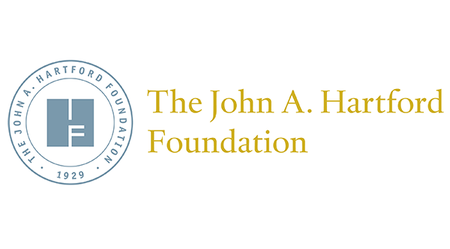Four New Grants Totaling Nearly $5 Million Approved by JAHF Board of Trustees at May 2019 Meeting

The John A. Hartford Foundation Board of Trustees has approved four grants totaling $4,899,327 for projects that will improve care for older adults by supporting a national strategy for family caregiving, improving serious illness and end-of-life care, and identifying ways to measure the impact of the Foundation's grantmaking and programs.
National Academy for State Health Policy: The RAISE Act Family Caregiver Resource and Dissemination Center ($2,548,586 for three years)
In recognition that as our nation ages, a growing number of us will be – or need – caregivers, the Recognize, Assist, Include, Support and Engage (RAISE) Family Caregiver Act was signed into federal law in 2018 to develop a national strategy to recognize and support family caregivers. This grant to the National Academy for State Health Policy will develop a Resource and Dissemination Center to support the work of the RAISE Act Advisory Council being assembled by the Administration for Community Living. The Resource and Dissemination Center will research policies and evidence-based programs, convene experts, provide information to the public and test the Advisory Council’s recommendations for family caregiving policies and programs in select states.
Icahn School of Medicine at Mount Sinai: The Center to Advance Palliative Care (CAPC), Improving Access to Quality Palliative Care ($1,925,742 for three years)
In order to improve the quality of care for seriously ill older adults, the Center to Advance Palliative Care (CAPC) has received a grant to support four interrelated activities. CAPC will increase access to and improve the quality of community-based palliative care, improve frontline clinician skills through a national campaign and competition known as The John A. Hartford Foundation Tipping Point Challenge, partner with the American Hospital Association to drive uptake of palliative care in health systems, and address palliative care financing and operational issues faced by Accountable Care Organizations and Medicare Advantage Plans through learning collaboratives.
National Academies of Sciences, Engineering, and Medicine: Roundtable on Quality Care for People with Serious Illness, Phase II ($250,000 for three years)The goal of this grant is to improve the care of older adults living with serious illness and at the end of life by supporting the National Academies of Sciences, Engineering, and Medicine to convene a second phase Roundtable on Quality Care for People with Serious Illness. The Roundtable will continue to promote and accelerate uptake of recommendations from its 2014 report, Dying in America: Improving Quality and Honoring Individual Preferences Near the End of Life. This consortia-supported effort plans to leverage nearly $2 million from a diverse group of over 30 funders, including health systems, national associations and payers.
RAND Corporation: Building Capacity for Future Impact Assessments ($174,999 for nine months)This grant will identify and develop measures to inform a prospective assessment of the Foundation’s impact in its three priority areas: Age-Friendly Health Systems, Family Caregiving and Serious Illness/End of Life. The resulting Impact Tool will build the Foundation’s capacity to track and share current and future outcomes from its grantmaking and programs.
